News
Government Seeks Investors for Food Estates
WINDONESIA June 28, 2024 A rice paddy field. (ANTARA/Makna Zaenar).
A rice paddy field. (ANTARA/Makna Zaenar).
The Indonesian government is looking for investors to support the development of its food estate project. President Joko "Jokowi" Widodo said that future food estate development would be driven by private funding sources.
"[We are] still looking for investors. What we are encouraging now is investment, not [funding] from the state budget," Jokowi said after inaugurating the construction of educational facilities and infrastructure in Central Kalimantan on Jun. 27, 2024.
The president previously said that the food estate project was the result of inter-ministry collaboration in an effort to anticipate the impact of a potential food crisis against Indonesia.
Jokowi admitted that developing food estate in a number of regions in the country is a difficult endeavor. He added that various problems in the food estate project could continue to occur. For that reason, the government plans to carry out evaluations and corrections to obtain the expected results.
Meanwhile, the harvest success rate for crops is targeted increase and normalize by the sixth or seventh planting.
“The first planting usually fails, the second planting can at most be 25 percent successful. The seventh, sixth time is usually in normal condition. So it's not as easy as assumed," He said.
Meanwhile, National Development Planning Agency (Bappenas) Maritime Affairs and Natural Resources Deputy Vivi Yulaswati noted that there is a food production center area (KSPP) program in the 2020-2024 National Medium-Term Development Plan (RPJMN). That program includes food estate areas in Central Kalimantan, North Sumatra and East Nusa Tenggara.
The development of KSPP, which include food estates, will continue in 2025 because it has been included in the government work plan (RKP) for that year.
The food estate that is being continued is the food estate that already exists currently, in those three provinces as well as the ones in Papua. Based on its evaluation, Bappenas divulged that several basic infrastructure development projects supporting food estates and commodity planting processes are already underway.
However, there is still a need for improvement efforts in the future. That includes, among other things, improvements related to harvest offtakers and harvest business models that could provide income for farmers. There's also improvements related to the preparation of human resource capacity, namely local farmers/farmer groups.
Apart from that, productivity also needs to be improved when compared to land that is already ready for planting. Bappenas notes that productivity is also influenced by variations in land characteristics, the commodities to be planted, human resources, as well as weather and/or climate.
Bappenas also requested regional governments to actively support the existence of KSPP or food estates. Their support could be done by carrying out monitoring and evaluation, preparing data from the regional government such as data on farmers and their markets, as well as facilitating budget allocation.
"The current RPJMN contains several regions proposed for food estates and KSPP. We are encouraging for not just [agricultural] extensification [because there is a potential for increased emissions, but] also intensification," Vivi explained.

